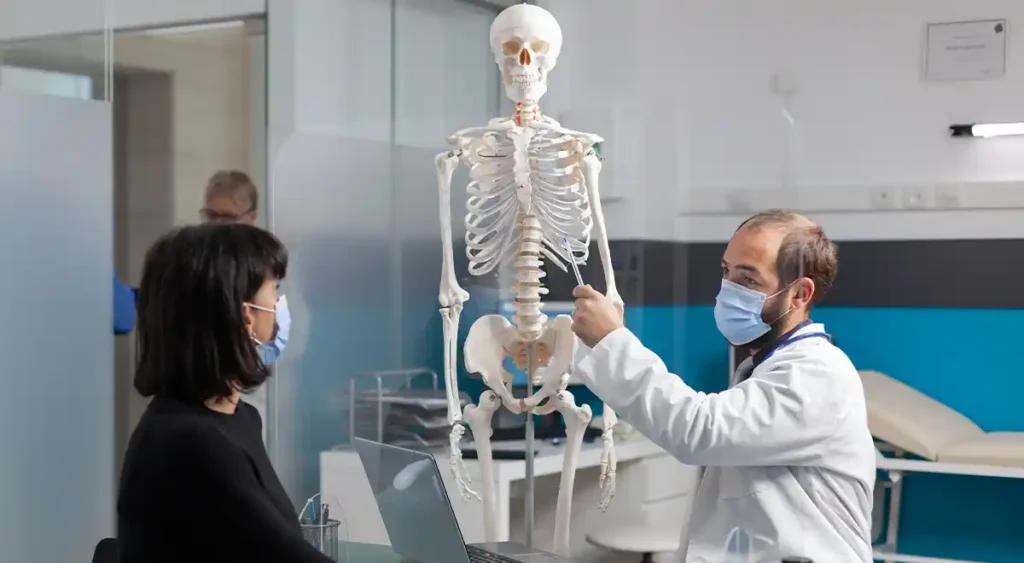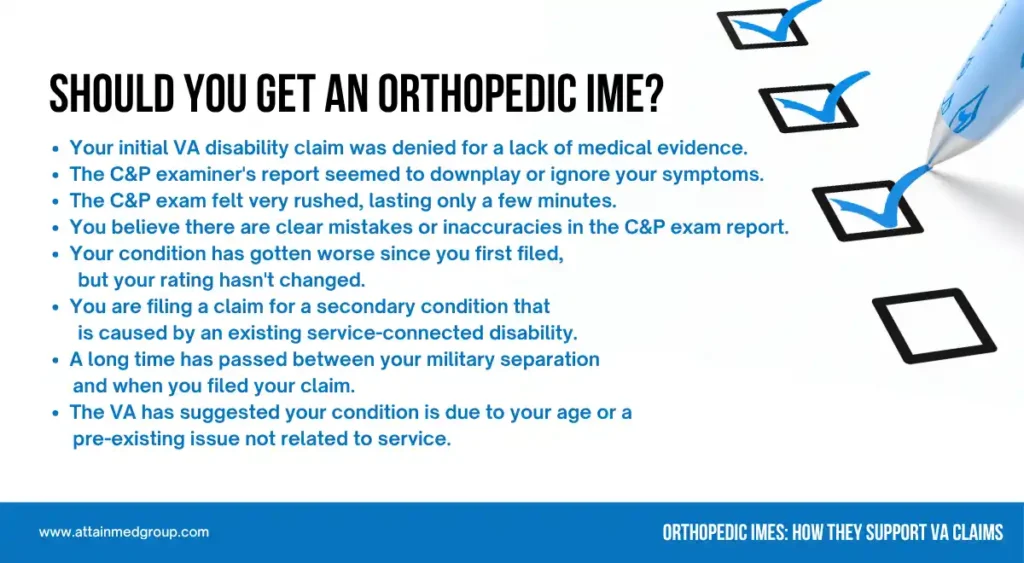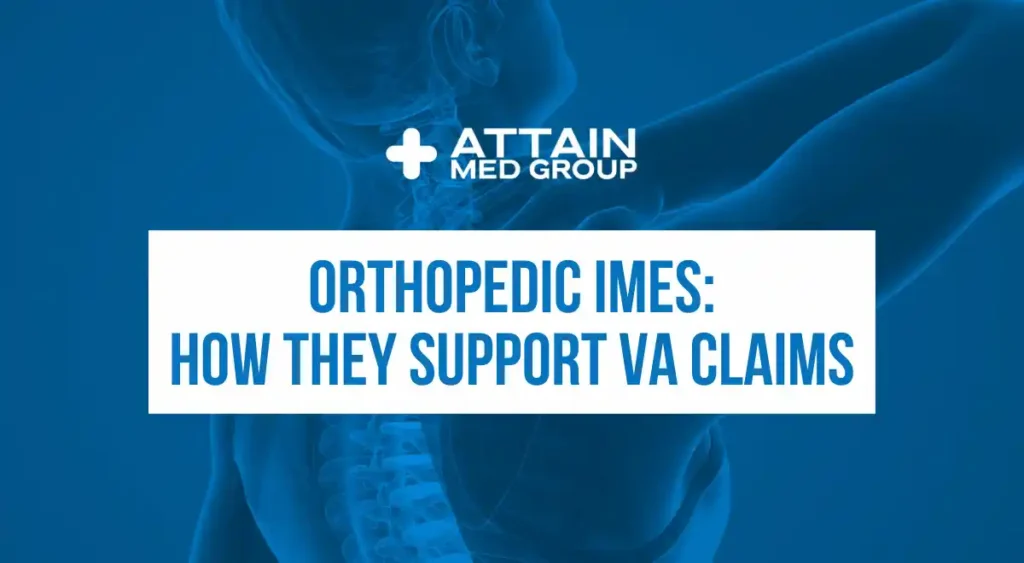Wondering if you need an orthopedic IME for a VA claim? Learn when back knee and shoulder conditions require specialist opinions. The VA disability claims process can often feel like a maze. You served your country, you have an injury, and you want the VA benefits you earned.
But then you run into confusing paperwork, long waits, and maybe even a denial of your VA claim. If this sounds familiar, especially for a back, knee, or shoulder condition, you are not alone. This isn’t just another form to fill out; an IME is a powerful tool that can make a huge difference in your claim.
It’s about getting expert medical opinions that specifically address what the VA needs to see. We will look at what an Independent Medical Examination (IME) is and when it becomes vital for your claim. This is especially true for the nagging joint pain and orthopedic disability issues so common for veterans.

What Exactly Is an Orthopedic IME?
An Independent Medical Examination sounds official, but it’s not as intimidating as it might seem. It’s a medical evaluation from a medical expert who is not your treating physician and is not employed by the VA. The entire point is to get an objective, third-party medical opinion about your claimed condition.
Think of this doctor as a neutral specialist. Their job is to review your medical history, your service records, and perform an examination. Then, they write a detailed report about their findings on your current disability.
An orthopedic IME is specific to veteran orthopedic conditions involving your musculoskeletal system. This includes your bones, joints, muscles, ligaments, and tendons. So for chronic pain from a back injury, knee pain, or a rotator cuff tear, an orthopedic specialist is the right expert for your condition claim.
How is an IME Different from a C&P Exam?
This is a critical distinction. The VA will schedule you for a Compensation & Pension (C&P) exam as part of the VA process. This exam is for the VA’s benefit, performed by a VA doctor or a contractor, and you must attend it.
An IME, on the other hand, is something you arrange for yourself. You choose the doctor and you pay for the exam. The goal is to gather more evidence to strengthen your VA disability claim, especially if you feel the C&P exam didn’t fully capture your disability caused by your service.

The “Why” Behind Getting an IME for Your Claim
Filing VA claims puts the burden of proof on you, the veteran. You have to show three things: a current diagnosis of a condition, an in-service event or injury, and a medical link between the two. That link, often called a “nexus,” is where many condition claims fall apart.
An orthopedic IME directly tackles this challenge. A good IME report from a specialist provides a strong medical opinion, often called a nexus letter. This letter will clearly state whether it is “at least as likely as not” that your condition is related to a specific service event.
According to the U.S. Department of Veterans Affairs, this is the legal standard your evidence must meet to win VA disability. A detailed report from a board-certified orthopedist carries significant weight with the VA. It gives the VA’s raters the clear evidence they need to approve your claim and establish the correct VA rating.
It also serves as a powerful rebuttal. If you had a negative C&P exam where the examiner said your back pain is just from getting older, an IME can counter that. A specialist can point to specific military duties or orthopedic injuries that caused or worsened your condition.
When Your Back, Knee, or Shoulder Claim Needs a Specialist’s Eye
So, when is it time to consider getting an IME? It’s not necessary for every claimed disability. But for certain situations involving common orthopedic conditions, it can be the difference between approval and denial of your VA disability claims.
Signs Your Back Condition Claim Could Use an IME
Back problems and low-back pain are among the most common orthopedic condition issues for veterans. The constant physical demands of service can take a toll. You should think about an IME if your VA claim for a back condition hits any of these roadblocks.
Your claim for chronic back pain was denied because the VA says it’s just due to age. An orthopedic specialist can explain how your military duties caused premature degenerative changes in your spine. They can differentiate between normal aging and the impact of your service.
You have a complex diagnosis like spinal stenosis or radiculopathy, where symptoms include numbness or shooting pain down your leg. A specialist can detail how these conditions are linked to a service injury and affect your ability to function. This level of detail is critical for getting the right disability ratings.
You have a secondary condition. Maybe your service-connected knee injury caused you to walk with a limp, and now you have debilitating back pain. An IME can establish that medical link, proving a secondary disability for your secondary conditions.
Red Flags for Knee Condition Claims
Your knees took a beating in the military, from marching with heavy packs to jumping out of vehicles. A claim for a knee condition might need the extra firepower of an IME in a few key scenarios. Many veterans require support for their knee pain.
Your claim was denied for lacking a direct link to service. Perhaps you hurt your knee, but it was never perfectly documented in your treatment records. An orthopedist can review your records and your current knee condition and give a medical opinion connecting the dots.
You have issues with range of motion or instability. The VA’s rating for knee conditions often depends on very specific measurements. The American Academy of Orthopaedic Surgeons notes that stability is essential to knee function, and an IME can give precise measurements and explain in medical terms why your knee gives out, which can lead to a higher VA disability rating.
You are claiming arthritis as a secondary disability. If you injured your knee in service, it’s very common to develop rheumatoid arthritis or osteoarthritis in that joint later. A specialist can write a strong nexus opinion stating the service injury was the direct cause of the arthritis you have today.

When to Get a Shoulder IME
Shoulder injuries, from dislocations to rotator cuff tears, can seriously limit your life. An IME is particularly helpful for shoulder claims when you are facing these issues. This is a common orthopedic disability that has helped veterans receive benefits.
Your injury was caused by repetitive strain. Many military jobs involve years of heavy lifting or overhead work, which doesn’t create one single “event” but causes wear and tear over time. An orthopedic expert can explain how your specific duties led to your shoulder condition.
Your range of motion is severely limited. A condition like “frozen shoulder” can be hard to prove without an expert opinion. An orthopedist can document the functional loss and explain how it prevents you from doing daily activities, impacting your disability ratings.
You have had multiple surgeries, but your claim is still stuck at a low rating. A specialist can review your entire medical history. They can then write a report that details the chronic nature of your disability and why a higher rating is medically justified.
A Checklist: Should You Get an Orthopedic IME?
Let’s make this simple. Look through this list. If you find yourself agreeing with one or more of these points, getting an IME is something you should seriously think about for your VA disability claim.

What Makes a Strong Orthopedic IME Report?
Not all medical opinions are created equal. A powerful IME report goes beyond a simple diagnosis. It should be a comprehensive document that leaves no room for doubt.
First, the report must show the medical expert has thoroughly reviewed all relevant evidence. This includes your service medical records, private treatment records, and any lay evidence you have submitted. A good report will reference specific documents from your file.
Second, the rationale must be clear and based on medical principles. The doctor should explain the “how” and “why,” connecting your military duties to your current orthopedic disability. For example, instead of just saying your back pain is from service, the report should explain how carrying heavy equipment caused specific degenerative changes in your L4-L5 vertebrae, referencing a specific diagnostic code if possible.
Finally, the report must contain a definitive nexus statement. This means using the VA’s preferred language, such as stating your condition is “at least as likely as not” related to your service. Vague statements are not helpful; the opinion needs to be decisive to influence how the VA determines your claim.
How to Find a Credible Orthopedic Specialist for an IME
Once you decide to get an IME, you cannot just go to any doctor. Finding the right specialist is critical for getting a useful and credible report. The doctor you choose needs to understand the specific language and requirements of the VA disability system.
Look for a physician who has experience working with veterans and writing nexus letters. They need to know what the VA is looking for in medical opinions. A report that just says “the veteran’s knee pain is severe” is not helpful; expert-level VA reports are much more detailed.
The most important thing is that the specialist must agree to review your entire claims file, or C-file. This is non-negotiable. A doctor cannot form a credible opinion without seeing all the evidence from your service and your medical records since.
You should know that you will have to pay for an IME yourself. It is an out-of-pocket expense, and it can be costly, but you should view it as an investment in your VA claim. A successful claim can result in significant annual benefits, so the upfront cost can pay for itself many times over. Resources from organizations such as VA Claims Insider VA can sometimes point veterans in the right direction.

Conclusion
Getting the VA disability benefits you deserve for your veteran orthopedic conditions shouldn’t be an uphill battle. But sometimes, you need to bring in a medical expert to make your case clear. You should no longer be wondering if you need an orthopedic IME for a VA claim; learn when back knee and shoulder conditions require specialist opinions is now clearer.
For complex back, knee, and shoulder conditions, or for claims that have been unfairly denied, an IME can provide the critical evidence needed to win. It gives you a voice in a process that can often feel like it isn’t listening. It can even be useful for other claims like sleep apnea or high blood pressure, showing the power of specialized medical evidence.
By getting a credible, independent medical opinion, you are taking control of your VA disability claim. This proactive step gives you the best possible chance at a successful outcome. It provides the strong evidence needed to secure the VA rating you have rightfully earned.

